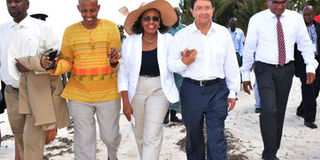World Bank urges closer cooperation

East African Affairs Commerce and Tourism Cabinet Secretary Phyllis Kandie (in hat), UNWTO Secretary General Taleb Rifai (2nd right) and Mombasa Coast Tourism Association chairman Mohamed Hersi (in yellow) take a walk along Mombasa white sand beach. FILE PHOTO | BRIAN WACHIRA | NATION MEDIA GROUP
What you need to know:
- Africa’s export potential in traditional services, such as tourism, is clearly recognised, but the emerging success of exports of non-traditional services, such as business, is often overlooked, the report says.
A World Bank report has praised the East Africa Tourism Platform (EATO) for showing strong leadership in championing a coordinated approach to enhance the region’s travel and tourism competitiveness.
It says the platform has enabled practitioners, policy makers, and regulators to engage in “meaningful dialogue” about critical issues that are currently transforming these services in sub-Saharan Africa.
“Co-operation initiatives are necessary to increase the regulatory capacity that African governments need to build over time to engage in meaningful liberalisation efforts,” says Alemayehu Geda associate professor of economics at Addis Ababa University.
“Through analytical support and technical assistance, the World Bank can assist African countries to improve regulation, facilitate services flows, and ultimately make services in Africa more competitive.”
Africa’s export potential in traditional services, such as tourism, is clearly recognised, but the emerging success of exports of non-traditional services, such as business, is often overlooked, the report says.
For example, more than 16 per cent of the accounting, architectural, engineering and legal firms in the Common Market for Eastern and Southern Africa (Comesa) countries are already engaged in exports, mainly to neighbouring countries.
“This contradicts official statistics, which assert that professional services exports for several countries are negligible or non-existent,” the report says.
“Likewise, many hospitals in sub-Saharan African countries are treating foreign patients and are using tele-medicine; yet official statistics often do not record such trade flows in medical services.”




